How the rest of the world celebrates Christmas
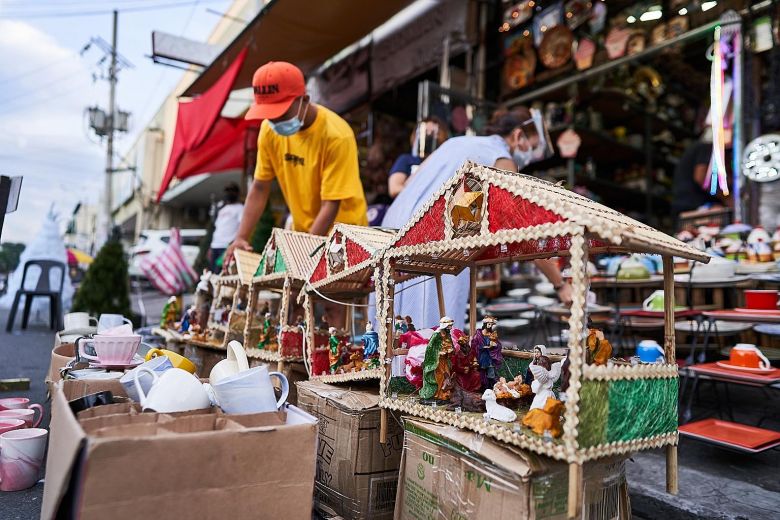
FILE PHOTO: At Manila’s Dapitan district, stores display Christmas-themed products at the start of the holiday season. PHOTO CRISTINA MENNA FOR THE STRAIT TIMES
TAIPEI—When she visited the Philippines last November, US Vice President Kamala Harris seemed delighted to learn that the Southeast Asian country celebrated Christmas season for three months in a year.
She brought this up at a meeting with President Ferdinand “Bongbong” Marcos Jr., who confirmed Harris’ information and said the celebration starts in September as Filipinos celebrate the season “like we invented it.”
“We certainly own it now. We start in September,” Marcos told Harris.
“Wonderful,” Harris said in response, chuckling.
What seemed to be ordinary for Filipinos was apparently extraordinary for other nations.
Article continues after this advertisementIn casual conversations in Taipei with foreign reporters at an official visit organized by Taiwan’s Ministry of Affairs (MOFA), another Christmas tradition unique to a nation was brought up.
Article continues after this advertisementAccording to Mark Hyung, one of the hosts of the program from MOFA, in Japan, people ate Kentucky Fried Chicken (KFC) for Christmas.
This was confirmed by one of the reporters, Jun Arai, a Japanese himself, who said long queues would form at KFC outlets in Japan during Christmas Eve.
Asked for an explanation, Arai said while it could be just KFC’s “marketing strategy,” it’s become a holiday tradition in Japan for as long as he can remember.
These stories prompted questions: How do other nations celebrate Christmas, what traditions are unique to them?
Reporters, who were part of the international press group in Taiwan, answered such curiosity.
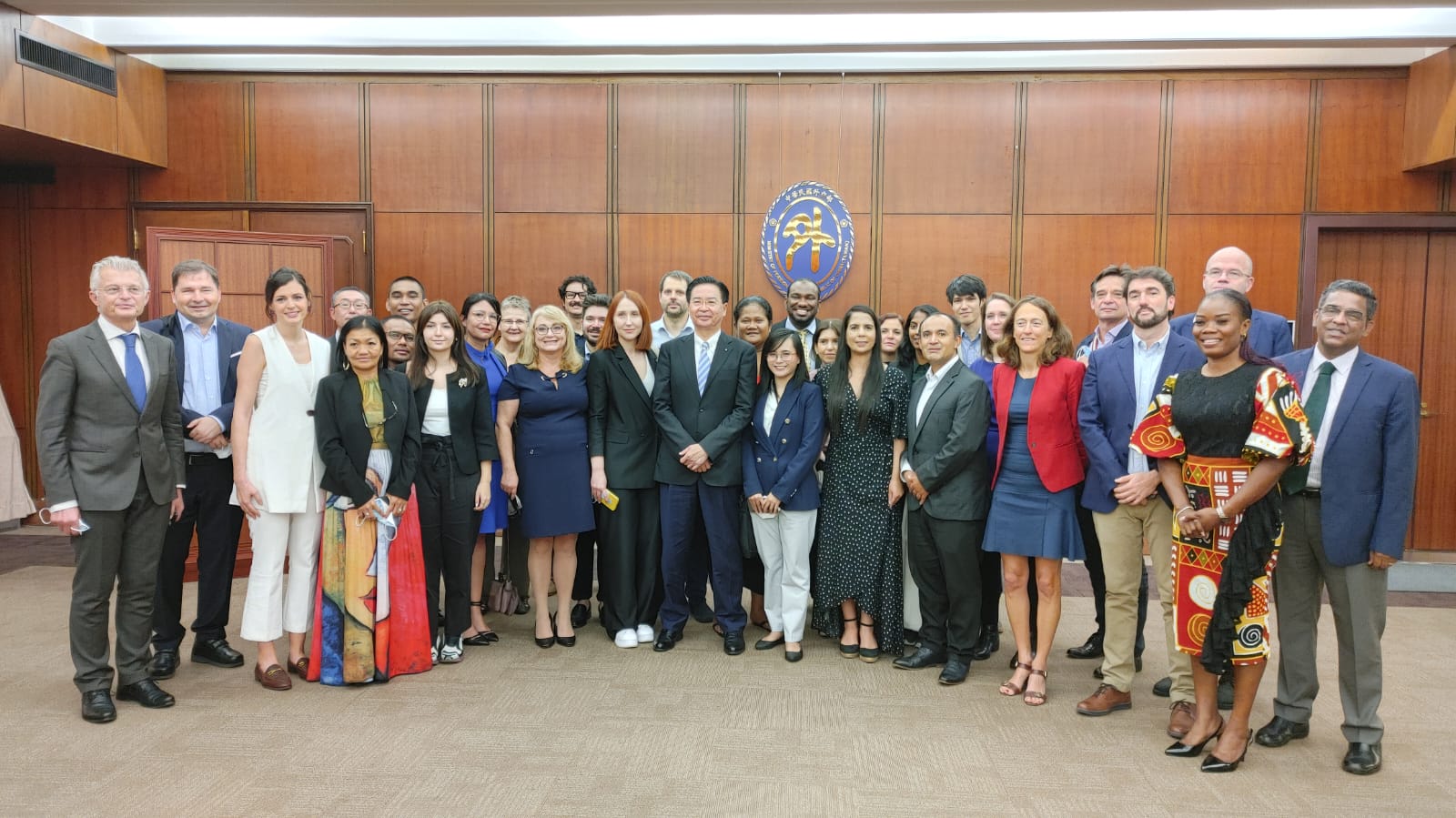
The international press group in Taiwan with officials of the MOFA. JAUSHIEH JOSEPH WU
The Netherlands: No presents on Christmas Day
In the Netherlands, Christmas rituals are the same as in other countries, journalist Eric Vrijsen said: Joyful songs, Christmas trees and a “desire for snow.”
“Except for one thing: no presents!” he told Inquirer.net.
Vrijsen explained that gift-giving, which usually occurs in other countries on Christmas Eve (December 24) or Christmas Day (December 25), is held much earlier in the Netherlands: December 6.
He said residents there believe that on the evening of December 5—’Sinterklaas’—a bishop who arrives by boat from Spain arrives in secret in every home to leave presents for children.
“Next morning (December 6), they [children] are playing with their new toys. Everyone is happy,” Vrijsen said.
He said Dutch immigrants took this tradition to the United States of America, “where ‘Sinterklaas’ became ’Santa Klaus,’” but children in the US had to wait until December 25.
Santa Klaus was also modeled after Sinterklaas as the latter is also a big white-bearded man in red. It is a popular belief that Santa Klaus goes down the chimneys of houses to leave presents under the Christmas tree and socks hung by the fireplace.
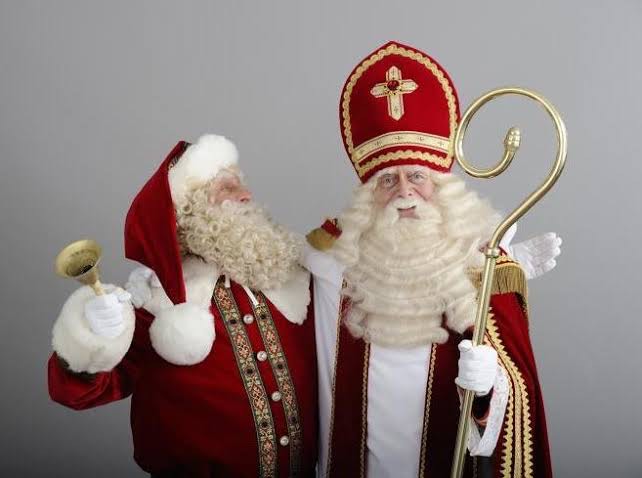
Santa Klaus (left) and Sinterklaas (right). PHOTO FROM HEAVENLY-HOLLAND.COM
Eventually, however, some families in the Netherlands, Vrijsen said, “due to busy schedules and workload,” changed Sinterklaas to Santa Klaus and adapted the gift-giving schedule of December 25.
But this, he said, stirred some “fierce debate” on the damage that it was bringing to their national heritage.
“[Some say] ‘why should we adapt to other countries’ habits and rituals? We invented Sinterklaas, so we should stick to it and leave Santa Klaus to the USA!’ But the trend here is different. Sinterklaas is becoming less important while the popularity of Christmas is growing,” Vrijsen said.
“Global economy doesn’t like national particularities,” he added.
He said this can be easily noticed in the streets of Amsterdam, Rotterdam and The Hague where people decorate their homes with Christmas lighting and Christmas trees as early as November.
“Before it was considered indecent to start Christmas decorations before December 5, which is the annual celebration of Sinterklaas. But nowadays people can’t wait and start decorating houses even in November,” Vrijsen said.
He also said lighting decorations are also now less prominent than they used to be due to “high energy prices.”
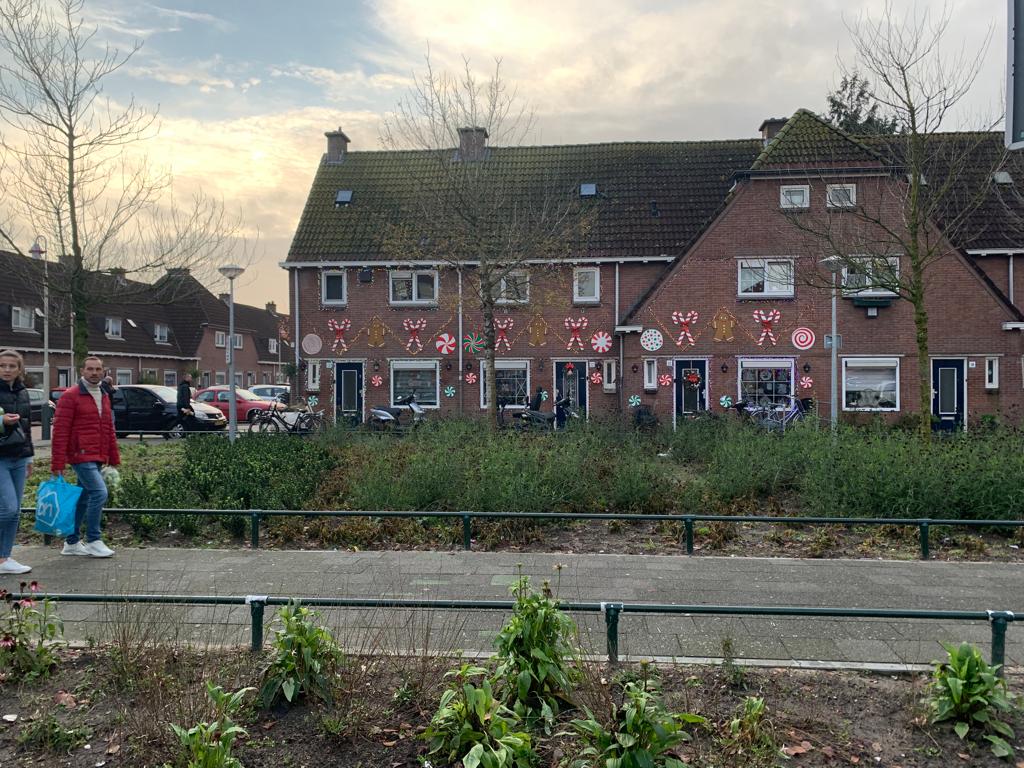
Christmas decorations in the Netherlands. SENT BY ERIC VRIJSEN
St. Lucia
In St. Lucia, an island in the Caribbean, Christmas is thought to start on December 13, Calixte George Jr., a resident reporter there, said.
This is their National Day, which is the Feast of St. Lucy, the island’s patron saint.
George said the island holds a “Festival of Lights,” where lantern-making competitions are also held.
Christmas music is also usually played by local musicians or “calypsonians” like “Pelé” and “Invader,” he said.
On New Year’s Day, people also hold a masquerade on the streets “involving various characters.”
George said there is also a tradition called “Jourvert,” which is “Kwéyòl” or French for “Day Break where people party until the morning.”
“Masquerade is usually done in the city as far as I know. Jourvert is usually at Christmas and is done in various parts of the island,” he told Inquirer.net.
Austria, Germany
For Austrians and Germans, days leading up to Christmas usually mean having to watch the “Sissi” trilogy, Austrian reporter Dorina Pascher said.
These are movies, which are from the 1950s, that are “highly popular” and are about Elisabeth, who is the former emperor of Austria.
Common food during Christmas celebrations, especially on Christmas Eve, include sausages with sauerkraut, or soup with sausages.
“It is not a fancy dish, because it should remind you of the humble origin of Jesus,” she said.
People also practice “Christbaum loben,” which Pascher said, translates word by word to “to praise the Christmas tree.”
This is when residents visit neighbors, “look at their Christmas trees, admire the nativity scene, eat cookies and drink mulled wine.”
Pascher also said it is usual for people to go to church in the evening—around 10 pm to 11 pm—on December 24 where at the end of Mass, everyone will sing “Silent Night, Holy Night.”
She said the song holds significance for Austrians and Germans as it was first performed in 1818 in a little church in her hometown in Salzburg, Austria.
Hungary
For Christmas decorations, Hungarians hang a wrapped candy, known as the “salon sugar,” on their Christmas trees.
These sweet delicacies, reporter Gergely Brückner said, is a Hungarian invention and its name comes from the fact that it used to be offered to guests in salons.

Salon sugar, a popular holiday treat in Austria and Germany. PHOTO SENT BY GERGELY BRUCKNER
Also part of their customs is the observance of “Luca’s Day” which is on December 13.
Bruckner said it is believed that on that day, St. Luca transformed into a witch, and it has been a tradition for people to insert garlic in their keyholes, place knives in door jambs, draw crosses using garlic, and display brooms forming a cross “to scare away witches.”
On the same day, women are not allowed to work because it is believed that if they knitted or sewed on Luca’s Day, the hens would not lay eggs.
“The girls also predicted their futures on Luca’s Day,” Bruckner said.
On Advent, which is also followed in the Philippines, Hungarians make an Advent wreath with four candles, where one candle is lit every Sunday.
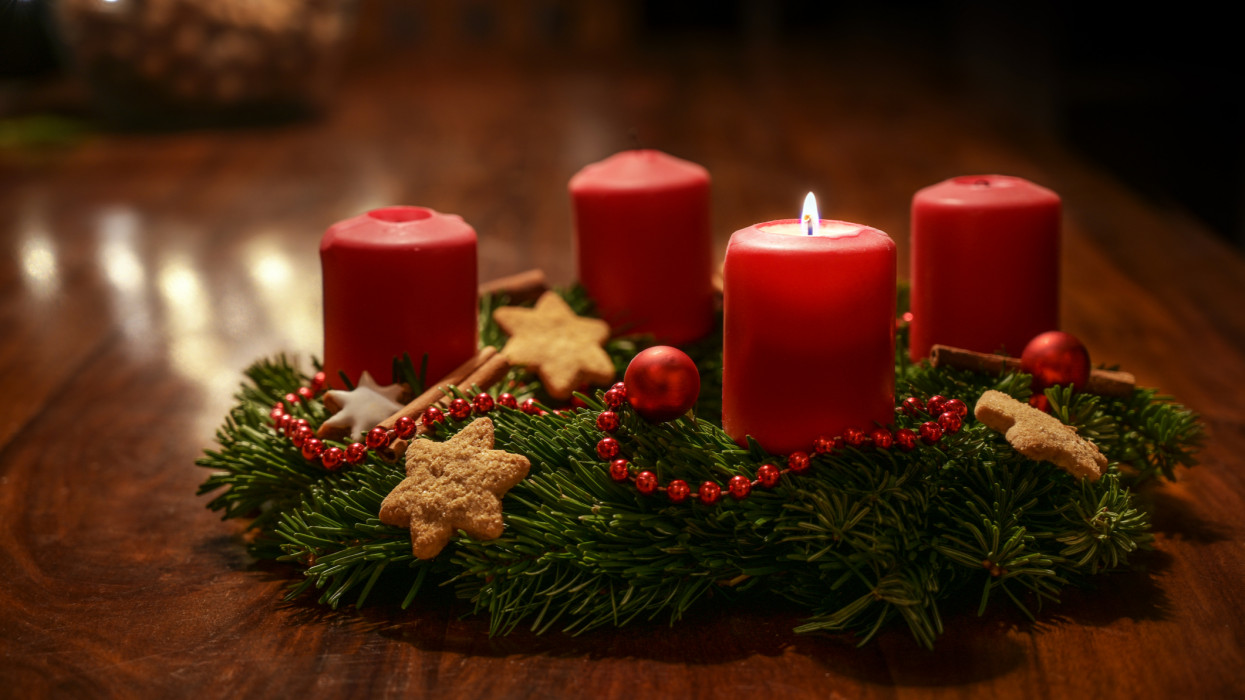
Hungary’s Advent wreath with four candles. PHOTO SENT BY GERGELY BRUCKNER
The Hungarians’ version of the Philippines’ noche buena, Bruckner said, is “unimaginable without fish, bagels, walnuts and a round apple symbolizing family togetherness.”
“In many places, after dinner, they still cut an apple into as many slices as there are at the table, saying: ‘as round as the apple is, so round, may the family be united in the coming year,’” he said.
Australia
Just as Japanese people line up for KFC chicken on Christmas Eve, Australians, especially in Queensland, queue for hours at seafood shops to get the best produce.
“We love seafood, especially prawns and Moreton Bay bugs,” Norris told me.
After lunch on Christmas Day, Norris said people gather for a game of “backyard cricket.”
While it is a popular belief that Santa Klaus goes down chimneys on Christmas Eve and leaves presents by the Christmas tree, which will be opened the next morning, in Australia, Santa Klaus arrives on the beach by rescue boat and hands out lollipops to children.
“When I was young, my grandmother would bake coins into the Christmas pudding and it was good luck to find one,” Norris shared.
“We also have carols by candlelight in local parks where everyone gathers with a candle to sing Christmas songs,” he added.
Chile
In Chile, people eat the Pan de Pascua Christmas bread, which is like the “German stollen bread,” with nuts and candied fruit, Chilean reporter Cristina Cifuentes said.
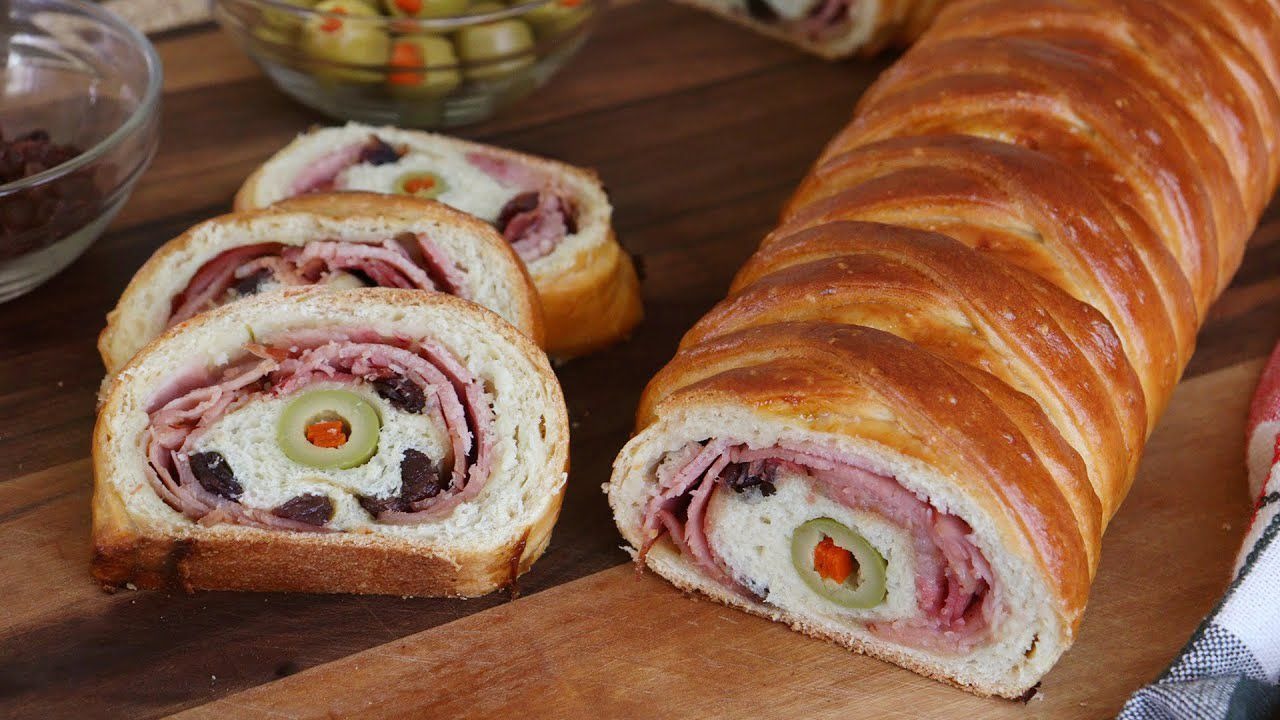
Chile’s Pan de Pascua. PHOTO SENT BY CRISTINA CIFUENTES
The bread is usually accompanied by a drink called “cola de mono.”
Christmas in Chile comes at the height of summer, so instead of the popular eggnog drink by the fireplace, Chileans make the “cola de mono” or the “monkey’s tail.”
This is served as cold as possible with the Christmas bread.
Portugal
In Portugal, people eat a dish called “bacalhau” or salted cod fish with boiled potatoes, eggs, and cabbage, Portuguese reporter Helena Tecedeiro said.
For dessert, they usually eat “sonhos” which means “dreams, and “rabanadas” which are slices of bread dipped in egg and fried.
Colombia
According to reporter Elber Gutierrez, Colombia is a country that mixes Spanish Catholic traditions with Caribbean and tropical ones.
“[This] is why Christmas is both the most important religious festival of the year and the excuse for the longest, funniest and most curious parties,” he said.
From December 16 to 24, the Novena de Aguinaldos is held, which, Gutierrez said, lasts for about an hour and “always ends with a party and special food.”
“You go in praying and you come out drunk,” he said.
Usually an alcoholic drink called aguardiente—a beverage that contains between 29% and 60% alcohol—rum or indigenous drinks, like “masato,” which is made from fermented corn, are drunk during the parties.
Salsa, merengue, tropical and cumbia are among the favorite music played during Christmas, Gutierrez said.
Typical Christmas food and drinks in Colombia are prepared with corn—from masato and chicha, to custard, cookies, snacks, fritters and wraps.
There are also called “Christmas Bonus Games”, Gutierrez said, which are usually “perfect excuses for shy young people to get a girlfriend.”
Among the famous ones is called “speak and do not answer” where a player will talk to another and the latter cannot answer. If the rule is violated, they should kiss.
“The adults play, but they don’t bet on kisses but money or bottles of Christmas wine,” he said.
Another game, which involves concentration, is called “Yes and No,” where players get to pick whether they will choose “yes” or “no” as answer.
“Suppose you choose to be NO and I choose to be YES. Every time you ask me something, whatever it is, I must answer with the word YES, which was the one I chose to play,” Gutierrez said.
“Otherwise, I lose the game and I must give you a kiss or money. It’s especially funny in the middle of public conversations, with people who have no idea that you and I are playing,” he added.
These are only some of the Christmas traditions that were shared during the Taiwan gathering of reporters. For sure, there are many others that are unique to every nation.
This just shows that each nation, each culture takes on a bit of the holiday and gives it a personal touch, something that they can call their own, though Christmas is something that is enjoyed and shared by all, wherever they are from.